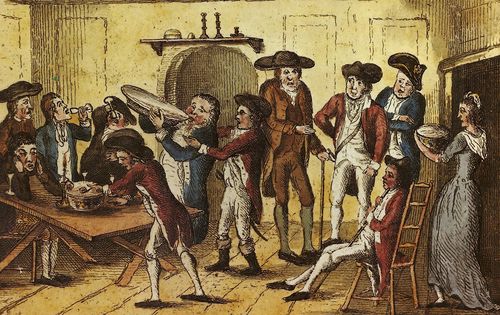Annotation:Powers of Punch (The): Difference between revisions
(Created page with "=='''Back to [[{{BASEPAGENAME}}]]'''== ---- <p><font face="garamond, serif" size="4"> '''POWERS OF PUNCH, THE''' (Cumacta na dig). Irish, Double Jig. G Major. Standard tuning...") |
m (Text replacement - "garamond, serif" to "sans-serif") |
||
| (3 intermediate revisions by one other user not shown) | |||
| Line 1: | Line 1: | ||
=='''Back to [[{{BASEPAGENAME}}]]'''== | =='''Back to [[{{BASEPAGENAME}}]]'''== | ||
---- | ---- | ||
<p><font face=" | <p><font face="sans-serif" size="4"> | ||
'''POWERS OF PUNCH, THE''' (Cumacta na dig). Irish, Double Jig. G Major. Standard tuning (fiddle). AABBCCDD. The word 'punch' derives from a Hindi word, ''panch'', meaning ‘five’, because of its five ingredients: spirits, water, lemon-juice, sugar and spices. The word was first recorded in English in 1669. | '''POWERS OF PUNCH, THE''' (Cumacta na dig). Irish, Double Jig. G Major. Standard tuning (fiddle). AABBCCDD. The word 'punch' derives from a Hindi word, ''panch'', meaning ‘five’, because of its five ingredients: spirits, water, lemon-juice, sugar and spices. The word was first recorded in English in 1669. The drink, according to liquor historian David Wondrich, became popular with British seamen who sailed into the tropics. A sailor's beer ration was ten pints per day, and was a staple of the shipboard company, but the warm temperatures caused the beer to spoil. Punch had more staying power in those climes however, and became a prized substitute. "They made it with local ingredients in India and Indonesia in the early 1600s," Wondrich tells NPR's Linda Wertheimer. "They were 13,000 miles away from any source of English beer or wine, and they had nothing to drink. And English sailors ... respond very poorly to that" [http://www.npr.org/2010/12/30/132444994/a-vintage-cocktail-that-packs-a-punch].[[File:punch.jpg|500px|thumb|right|]] | ||
<br> | <br> | ||
<br> | <br> | ||
</font></p> | </font></p> | ||
<p><font face=" | <p><font face="sans-serif" size="4"> | ||
''Source for notated version'': | ''Source for notated version'': | ||
<br> | <br> | ||
<br> | <br> | ||
</font></p> | </font></p> | ||
<p><font face=" | <p><font face="sans-serif" size="4"> | ||
''Printed sources'': O'Neill ('''Dance Music of Ireland: 1001 Gems'''), 1907; No. 352, p. 72. | ''Printed sources'': O'Neill ('''Dance Music of Ireland: 1001 Gems'''), 1907; No. 352, p. 72. | ||
<br> | <br> | ||
<br> | <br> | ||
</font></p> | </font></p> | ||
<p><font face=" | <p><font face="sans-serif" size="4"> | ||
''Recorded sources'': <font color=teal></font> | ''Recorded sources'': <font color=teal></font> | ||
<br> | |||
<br> | |||
</font></p> | |||
<p><font face="sans-serif" size="4"> | |||
See also listing at:<br> | |||
Hear the tune played at the Comhaltas Archive by the Longridge Céilí Band [https://archive.comhaltas.ie/compositions/5284#/tracks/15197][https://archive.comhaltas.ie/search?q=composition_id%3A5284] and by Merain on youtube.com [https://www.youtube.com/watch?v=H0Fpd9uAZs4]<br> | |||
</font></p> | </font></p> | ||
<br> | <br> | ||
Latest revision as of 14:35, 6 May 2019
Back to Powers of Punch (The)
POWERS OF PUNCH, THE (Cumacta na dig). Irish, Double Jig. G Major. Standard tuning (fiddle). AABBCCDD. The word 'punch' derives from a Hindi word, panch, meaning ‘five’, because of its five ingredients: spirits, water, lemon-juice, sugar and spices. The word was first recorded in English in 1669. The drink, according to liquor historian David Wondrich, became popular with British seamen who sailed into the tropics. A sailor's beer ration was ten pints per day, and was a staple of the shipboard company, but the warm temperatures caused the beer to spoil. Punch had more staying power in those climes however, and became a prized substitute. "They made it with local ingredients in India and Indonesia in the early 1600s," Wondrich tells NPR's Linda Wertheimer. "They were 13,000 miles away from any source of English beer or wine, and they had nothing to drink. And English sailors ... respond very poorly to that" [1].

Source for notated version:
Printed sources: O'Neill (Dance Music of Ireland: 1001 Gems), 1907; No. 352, p. 72.
Recorded sources:
See also listing at:
Hear the tune played at the Comhaltas Archive by the Longridge Céilí Band [2][3] and by Merain on youtube.com [4]
